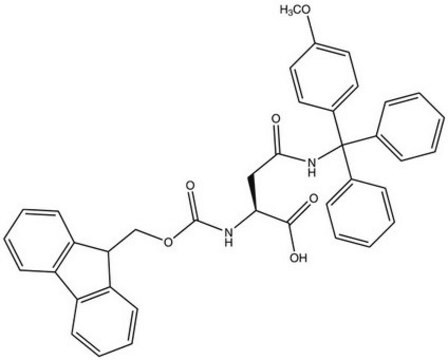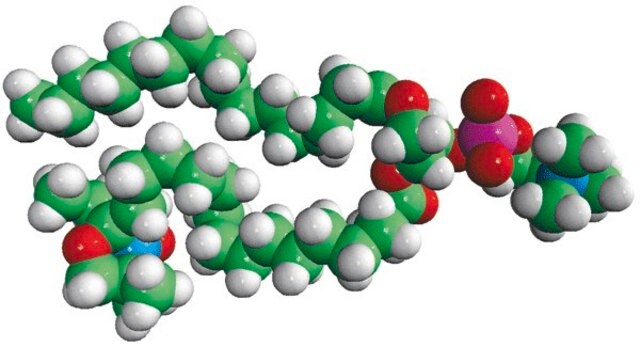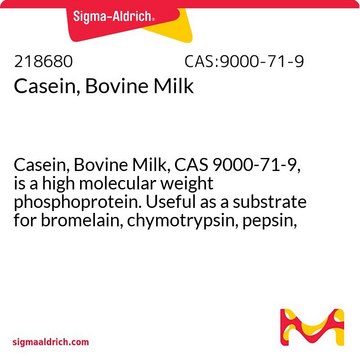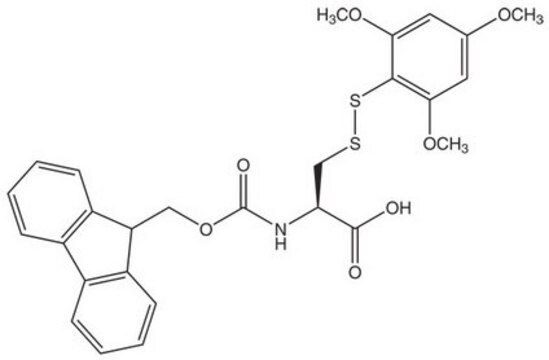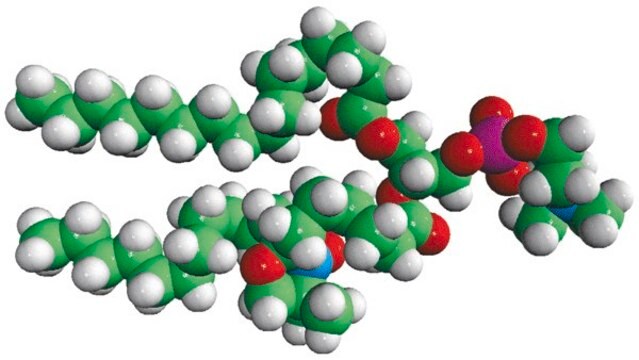810600P
Avanti
16:0-12 Doxyl PC
Avanti Research™ - A Croda Brand 810600P, powder
Sinônimo(s):
1-palmitoyl-2-stearoyl-(12-doxyl)-sn-glycero-3-phosphocholine
Faça loginpara ver os preços organizacionais e de contrato
About This Item
Fórmula empírica (Notação de Hill):
C46H90N2O10P
Número CAS:
Peso molecular:
862.19
Código UNSPSC:
41141825
NACRES:
NA.25
Produtos recomendados
Ensaio
>99% (TLC)
Formulário
powder
embalagem
pkg of 1 × 1 mg (810600P-1mg)
fabricante/nome comercial
Avanti Research™ - A Croda Brand 810600P
tipo de lipídio
ESR probes
phospholipids
Condições de expedição
dry ice
temperatura de armazenamento
−20°C
Descrição geral
Avanti′s nitroxide spin product listing is a group of compounds designed to act as membrane probes. A variety of positions down the hydrophobic chain are labeled with the nitroxide functional groups to allow probing the membrane at various depths. These compounds have been synthesized from 1-palmitoyl-2-hydroxy-sn-glycerol-3-phosphocholine with the product being purified by column chromatography. Various n-doxyl phosphocholines have been recently used as biophysical tools to elucidate membrane trafficking with phosphatidylinositol transfer proteins and as fluorescent quenchers in lipid bilayer structural studies.
Phosphatidylcholine (PC) is a strong bilayer-forming lipid. It the most common phospholipid in mammalian membranes. It is also an important component of the mucosal layer of the colon. 1-palmitoyl-2-stearoyl-(12-doxyl)-sn-glycero-3-phosphocholine (12-NO-PC) is a nitroxide-labeled phospholipid.
Aplicação
16:0-12 Doxyl PC is suitable for use:
- as a lipophilic collisional quencher to prepare liposomes used in lipophilic quenching experiments
- to prepare liposomes used in nitroxide quenching experiments to examine the location of each NBD (7-nitrobenz-2-oxa-1,3-diazole) probe in mutants
- as a component in POPC or 1:1 1-palmitoyl-2-oleoyl-sn-glycero-3-phosphocholine (POPC)/1-palmitoyl-2-oleoyl-sn-glycero-3-phospho-rac-1-glycerol (POPG) mixtures to prepare unlabelled large unilamellar liposomes
Ações bioquímicas/fisiológicas
Phosphatidylcholine (PC) functions as a surfactant within the mucus to form a hydrophobic surface to inhibit bacterial penetrance. It is used to treat fat embolism. Phosphatidylcholine lowers the levels of cholesterol and triglycerides.
Embalagem
5 mL Clear Glass Sealed Ampule (810600P-1mg)
Nota de preparo
To prevent aggregation, prepare water-based solutions of 2 mM stock solutions of n-DOXYL PCs and store in plastic. Dilute stock solutions to 0.03- 0.1 mM solutions for EPR studies. For liposome preparations in fluorescent quenching measurements, dissolve the doxyl lipid in 150 μl absolute ethanol for a concentration of 40.3 mM. href="https://pubs.acs.org/doi/suppl/10.1021/ja804929m/suppl_file/ja804929m_si_001.pdf"target="_blank">Supplemental information
Informações legais
Avanti Research is a trademark of Avanti Polar Lipids, LLC
geralmente comprado junto com este produto
Nº do produto
Descrição
Preços
Código de classe de armazenamento
11 - Combustible Solids
Escolha uma das versões mais recentes:
Certificados de análise (COA)
Lot/Batch Number
Lamentamos, não temos COA para este produto disponíveis online no momento.
Se precisar de ajuda, entre em contato Atendimento ao cliente
Já possui este produto?
Encontre a documentação dos produtos que você adquiriu recentemente na biblioteca de documentos.
Lipid-specific binding of the calcium-dependent antibiotic daptomycin leads to changes in lipid polymorphism of model membranes
Jung D, et al.
Chemistry and Physics of Lipids, 154(2), 120-128 (2008)
The Membranes of Cells, 154(2), 120-128 (2016)
Integrative Medicine - E-Book, 154(2), 120-128 (2017)
Structural insights into the membrane-anchoring mechanism of a cholesterol-dependent cytolysin
Ramachandran R, et al.
Nature Structural and Molecular Biology, 9(11), 823-823 (2002)
The mechanism of membrane insertion for a cholesterol-dependent cytolysin: a novel paradigm for pore-forming toxins
Shatursky O, et al.
Cell, 99(3), 293-299 (1999)
Nossa equipe de cientistas tem experiência em todas as áreas de pesquisa, incluindo Life Sciences, ciência de materiais, síntese química, cromatografia, química analítica e muitas outras.
Entre em contato com a assistência técnica